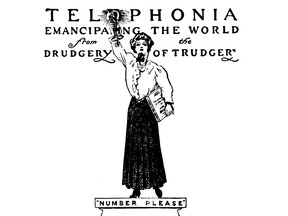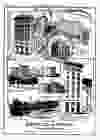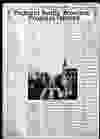The Vancouver World went all out with a 96 page Progress and Building Edition promoting Vancouver

The Vancouver World was known for publishing special features or editions promoting Vancouver.
Recommended Videos
The most famous are two “birds eye view” maps that The World published of Vancouver in 1890 and 1898. They’re called bird’s eye views because they purport to show every building in the city from the viewpoint of a bird soaring high in the sky.
Vancouver had grown too large for a bird’s-eye view map of the entire city by 1912. But The World made up for it but publishing the Vancouver World Progress and Building Edition on Jan. 6. 1912.
The city was in the midst of a boom. The population almost quadrupled from 27,010 in 1901 to 100,401 in 1911. The metropolitan population grew from 36,124 to 171,896 over the same period.
The World cashed in by producing a 148-page paper on Jan. 6, which was a Saturday. The Progress and Building Edition was 96 pages, and wrapped around the daily paper.
The World’s owner, L.D. Taylor, was Vancouver’s mayor in 1910 and 1911, and was running for a third term in 1912. He wasn’t shy about promoting himself in his paper — a stylish photo of Taylor at his desk was on the front page of the Progress and Building Edition.

The Progress and Building Edition was pure boosterism.
“Vancouver, the Roaring City of Industry,” is the headline on one story.
“British Columbia, The Lumber Yard of The World,” read another.
“Whale Hunting an Important British Columbia Industry,” reads a third.
There are also stories on Vancouver’s municipalities, such as “Fashionable Point Grey, Where Vancouver’s Esthetic Rich Are Building Splendid Mansions,” “Burnaby the Beautiful — Story of a Model Municipality” and “South Vancouver: Where the Renter Ceases Troubling and the Landlord is at Rest.”
Naturally, the Progress and Building Edition was filled with ads.
General contractors McDonald and Wilson took out a full-page ad featuring a montage of the buildings they had worked on, including the Carter Cotton building at Cambie and Hastings, the B.C. Electric building at Carrall and Hastings, and the courthouse at Georgia and Howe.

The B.C. Telephone Company took out a half-page ad showing how customers had signed up for telephones at an exponential clip in 1910 and 1911.
In January 1910 there were 8,131 Vancouver telephones. By December 1910 there were 10,856. In January 1911 there were 11,227, and in December 1911 there were 16,160.
The ad was illustrated by a female telephone operator holding an old two-piece “candlestick” telephone. Her right hand is holding the phone aloft, like the lamp on the Statue of Liberty, while her left hand holds a telephone directory.
The operator had a name like a Greek Goddess: “Telephonia,” who the ad claims was “Emancipating the World from the Drudgery of Trudgery.”
There was also a page of briefs about Vancouver and British Columbia, “Pregnant Pacific Province Progress Pointers.”
Some of its one-liners are ludicrous (“Vancouver, City of Sunshine”), some are head scratchers (“Vancouver, City of Smiling Zephyrs”) and some show the era (“In British Columbia’s 182,000,000 acres of forest lands, the woodsman’s axe has scarcely been heard”).
Of course many are pure boosterism, such as “Vancouver: Best Market in the World for Brains, Muscle and Energy” or “While Vancouver is more advantageously situated for internal and ocean commerce than any other city of the continent, the beauty of its situation excels that of Naples, Venice or New York.”

Newspapers of the day had few bylines, but the overall tone of the Progress and Building Edition surely came from L.D. Taylor, who was the editor of the paper as well as its publisher.
Taylor is Vancouver’s longest-serving mayor serving 11 years between 1910 and 1934. But he was also defeated several times, including in the 1912 election, which he lost to James Findlay.
Vancouver had an economic recession that started in 1913 and went on throughout the First World War. Taylor had financial difficulties, and lost control of the Vancouver World in 1915.


